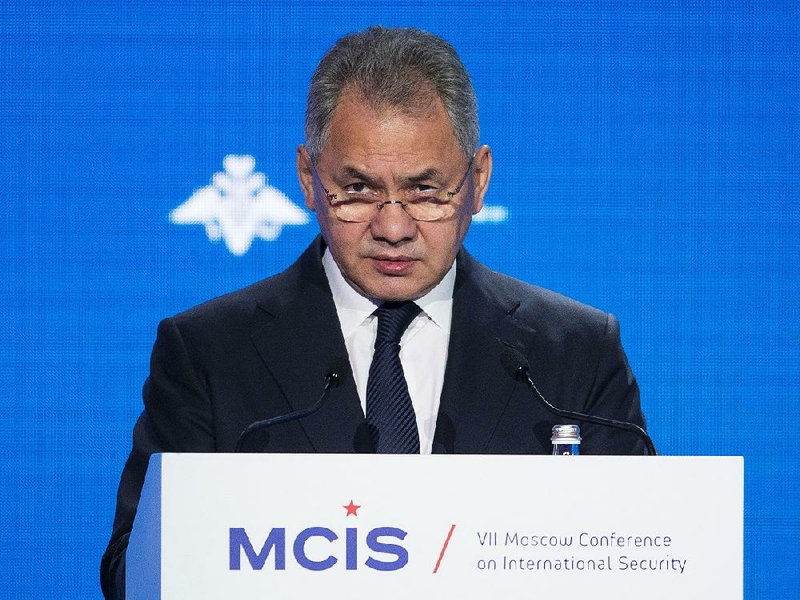MOSCOW -- Top Russian defense and security officials on Wednesday launched diatribes at the West, accusing it of fomenting a new Cold War in a bid to retain waning influence in global affairs.
Moscow used an annual security conference attended by top defense officials from Asia, Africa and Latin America to harshly criticize the U.S. and its allies, accusing them of putting global stability at risk.
Russian Defense Minister Sergei Shoigu accused the U.S. and its NATO allies of using "the nonexistent Russian threat to methodically boost their military potential" and beef up their forces near Russia's borders.
Shoigu emphasized that the U.S.-led missile defense program has become a "major destabilizing factor inciting an arms race."
He pointed at a growing number of NATO intelligence flights near Russia's borders and an increasing pace of NATO's military drills, noting that they have "a clear anti-Russian character."
"The danger of provocations and military incidents has significantly increased," Shoigu said.
Russia-West relations have sunk to their lowest level since the Cold War after Moscow's 2014 annexation of Crimea and support for separatists in eastern Ukraine, differences over the war in Syria and the allegations of Russian meddling in the 2016 U.S. presidential election.
Shoigu said NATO has stonewalled Moscow's attempts to engage in a dialogue, adding that "we aren't going to knock on the closed door, but will not leave attempts to apply pressure on us unattended."
He warned that Moscow will respond to NATO's moves by strengthening its defense capabilities to "ensure military security of Russia and its allies."
Meanwhile, Russia began a live-fire military exercise in the Baltic Sea, just outside of NATO territorial waters, in a move a top Latvian defense official called a "show of force" just a day after their president and other Baltic leaders met in the Oval Office with U.S. President Donald Trump.
The three-day missile test forced a partial shutdown of Latvian civilian airspace and was the first time Russia has tested live munitions in Latvia's exclusive economic zone, a stretch of international waters just outside Latvia's territory in the Baltic Sea. Latvian defense officials said they were carefully monitoring the situation.
"What concerns us is that it's the first time when they've actually exercised so close to our borders," said Janis Garisons, the state secretary of the Latvian Defense Ministry. "We regard it as a show of force, nothing else. There have not been any kinds of provocative actions, but there are still two days to come."
The presidents of Latvia, Lithuania and Estonia all met Trump at the White House on Tuesday, a long-planned visit that came as the countries celebrated their 100th anniversaries of independence. During World War II, they were occupied by the Soviet Union and did not regain sovereignty until 1991.
Russia-West tensions escalated last month after the poisoning of an ex-Russian spy in Britain, leading to mass expulsions of diplomats by the West and Russia. Britain has blamed Russia for the poisoning of former double agent Sergei Skripal and his daughter, accusations that Russia has vehemently denied.
Sergei Naryshkin, the director of Russia's Foreign Intelligence Service, told the conference that the attack on Skripal was a "grotesque provocation rudely staged by the British and U.S. intelligence agencies." British and U.S. officials have previously rejected similar Russian allegations.
"Washington has become fixated on fighting the nonexistent Russian threat, and that fight has reached such a scale and acquired such absurd traits that we can talk about the return of the gloomy times of the Cold War," Naryshkin said.
He said the U.S. and its allies have been unable to adapt to global changes, including a growing role of China, Russia and other countries.
"The U.S. and part of Europe have failed to prepare for such changes; they can't accept inevitable weakening of their once overwhelming clout," he said. "Engulfed by fear of change, the West is ready to surround itself with a new Iron Curtain."
Information for this article was contributed by Vladimir Isachenkov of The Associated Press and by Michael Birnbaum of The Washington Post.
A Section on 04/05/2018
